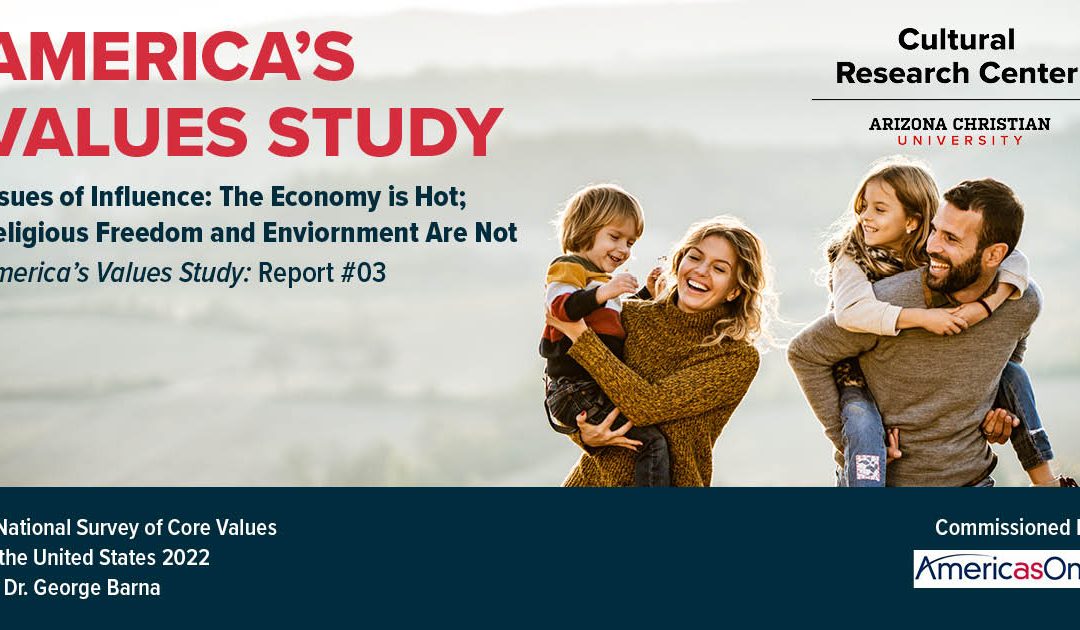Tracy F. Munsil | October 21, 2022 | America’s Values Study
From the Cultural Research Center at Arizona Christian University
Americans intend to vote their pocketbook in the upcoming midterm elections, especially when it comes to three economic worries—inflation, food prices, and gas prices.
New findings from a national survey of American adults show that the rising cost of living will most influence American voters, with 61% listing the issue as having “a lot of influence” in how they will vote. Food prices and shortages were identified by 60%, and oil and gasoline policies and prices were named by roughly six out of 10 adults, at 58%. Another economic issue—jobs and unemployment—was rated as the 8th most influential issue (45%).
The new findings from Dr. George Barna and the Cultural Research Center at Arizona Christian University identified broad consensus among American adults of all ages and ethnic groups when it comes to their deep concern about the nation’s economy.
According to the America’s Values Study, the three other issues in voters’ top five are crime, policing and personal safety, cited by half of American adults (50%). Tied for 5th are the cost and availability of health insurance and healthcare, and protection against terrorism—both weighing in with 47%.
The five issues that emerged as the least likely to have significant influence include: policies related to foreign relations, military and defense (34%); religious freedom (36%); environmental policies (also 36%); government size, authority, and performance (36%); and income inequality and redistribution (37%).
According to Barna, the results will likely bode poorly for Democrats in November.
“Many of the most influential issues in this election are those that highlight publicly perceived failures by the Democrats,” Barna said. “The highest-impact issues—specifically, inflation, the cost of food and related shortages, and policies and prices related to gas and oil—all highlight turns for the worse over the past two years, when Democrats have held the White House and both chambers of Congress.”
Barna said the findings suggest there may “be substantial change in the two federal legislative bodies given the confluence of anger with the condition of America, the historical tendency to replace the prevailing party in midterm elections, the unusually large number of incumbents not seeking re-election, and the fact that the issues of greatest importance to voters underscore public dissatisfaction with Democrat rule.”
ACU President Len Munsil said the findings may indicate the beginning of a shift in America’s political thinking.
“As we know from Dr. Barna’s research documenting America’s biblical worldview crisis, it will take more than one election to change our nation’s trajectory,” Munsil said. “It will take a revival not just in the political realm, but in the hearts and minds of the American people. While this survey mostly shows dissatisfaction with current economic conditions, it does not yet reflect a shift away from our current moral and cultural conditions.”
“Cultural transformation can only happen with a significant shift in worldview—to move us from where we are now, with very few American adults possessing a biblical worldview, to where God’s truth is widely embraced by our nation,” Munsil said. “Only by dramatically increasing biblical worldview in America will we see true and lasting transformation.”
Other issues were identified in the study as having substantial influence among various age and ethnic segments:
- Only young voters—under 35—listed abortion as a major voting influence. Their other highly ranked issues in that demographic were racism and health insurance/costs.
- Beyond the consensus economic issues, adults 35 to 49 embraced crime/policing/safety and jobs among their most influential issues.
- People 50 to 64 years old and those 65 or older added crime, healthcare costs and protection against terrorism to the consensus issues.
- Other than the consensus issues, white adults named crime/policing/safety and protection against terrorism as their vote-affecting issues.
- In contrast, black adults identified racism, poverty/homelessness, and crime/policing/safety as their other top-ranked considerations.
Among all religious segments of the population, the three top-ranked issues—inflation, food prices, and gas prices—were nearly universal. Interestingly, other top-five priorities shift somewhat by religious segment:
- For example, religious freedom is a top-five issue only among people with a biblical worldview and those who identify the Bible as their primary source of moral guidance.
- Only those who see the Bible as their primary source of moral guidance included protection against terrorism in their top five.
- Theological conservatives were the sole segment to list immigration in their five most influential issues.
- Racism is a top five issue only among those who say they are theologically liberal and among adults who do not associate with Christianity. The latter segment was also the only one to include the cost of health insurance and health care in their list.
Surprisingly, religious segments such as born-again Christians and people who regularly attend evangelical churches did not include issues such as abortion, national morals and values, and religious freedom in their top-five lists.
America’s Values Study: A National Survey of Core Values in the United States 2022 is based on two nationwide surveys commissioned on behalf of AmericasOne and conducted in July 2022 to identify key beliefs among American adults.
The full report by George Barna, America’s Values Study: “Report #03: Issues of Influence: The Economy is Hot; Religious Freedom and Environment are Not,” available here.

